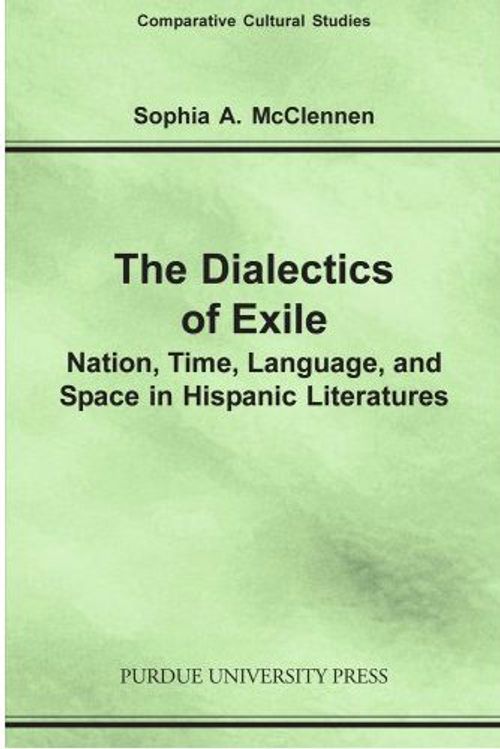
“In this superb book, Sophia A. McClennen illuminates the dilemmas of language, identity, and diaspora in ways that are refreshing and original.”— Ariel Dorfman, Duke University, author of Death and the Maiden
— John Ochoa, Latin American Research Review“Sophia McClennen’s fine Dialectics of Exile, which is not meant to be a comprehensive overview but rather a reconsideration of a particular period along thematic lines. McClennen’s book limits itself to three case studies, analyzing the works and lives of the Chilean Ariel Dorfman, the Uruguayan Cristina Peri Rossi, and the Spaniard Juan Goytisolo (the inclusion of Goytisolo places this book under the rubric of transatlantic studies, a growing academic niche in recent years). […]
“This book offers a theoretically aware argument that draws from established concepts from theories of national identity, postnationalism, and postmodernism, as well as from linguistics, feminism, and Marxism. What is unusual about it is that it does not deal with exile as a negative, traumatic event that is in effect all aftermath, as is commonly the case. Instead, it casts exile as a positive and ongoing mode of evolving cultural identity. McClennen presents exile as the initiation of an ongoing ‘dialectic,’ a word rich with Marxist, linguistic, and aesthetic resonances, all of which she mines successfully. The cultural production of exile, she rightly notes, needs to be read as a series of ‘dialectical tensions,’ rather than as static, binary oppositions where one end of the binary is favored in the interpretation (28).
“This book engages with fundamental questions head on: what is the difference between an exile and an immigrant? What is the concept of ‘homeland?’ How is the process of representation, never a simple one, complicated by displacement? “The crisis of language” of the exile, writes McClennen, ‘while revealing a crisis in the subject, does not lead to the end of representation’ (119). Rather, the literature of exile ‘often revolves around the exile’s sense of loss,’ or the ’exile’s sense of freedom once the bonds of the nation are loosened. The exile often attempts to rewrite national history and also often attempts to rewrite [. . . ] notions of community that are not predicated on the nation’ (222). McClennen’s insightful ruminations on the dynamics of exile are well-taken and their implications wide-ranging.”
“From the shores of exile, writing in Spanish has engaged in the politics of memory as un urgent challenge to the politics of oblivion. Sophia A. McClennen’s much-needed and long overdue book bridges this transatlantic dialogue. Her analysis proves that these literatures are a revision of reading that moves literature from a monological archive towards the unsheltered territory of radical dialogue.”— Julio Ortega, Brown University
“Sophia McClennen’s book responds to a pressing need to theorize an issue that involves many questions concerning notions of power, identity, and memory—all of them pivotal to the study of Hispanic culture on both sides of the Atlantic.”— Maria Helena Rueda, Smith College
“By inverting the conventional interpretive logic in which literary texts are simply made to ‘prove’ the claims of theory and setting out to show how the texts might also be capable of criticizing and even disproving certain theoretically-based critique, McClennen succeeds in a truly theoretically-based critique. I am especially impressed with her grasp of the real centrality of the concept of narration, in its broadest sense, to the question of exile.”— Neil Larsen, University of California-Davis
“Our analysis of literary exile, McClennen insists, and I agree, should transcend the facile dichotomies as to whether ’exile produces creative freedom or it traps the writer in restrictive nostalgia.'”— Paul Tiyambe Zeleza, A Modern Economic History of Africa